| What's Hot! | Products/ Tools | EFI Tuning | Basic Tuning | Advanced Tuning | Chassis Tuning | Advertise with us |
Blow Off Valves ( BOV )
A look at understanding how blow off valves work and why they are important. Resurc vs atmospheric
Contributed by: enginebasics.com
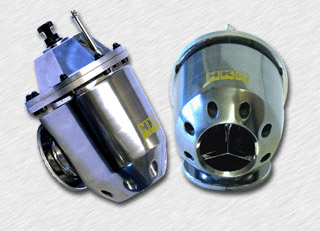
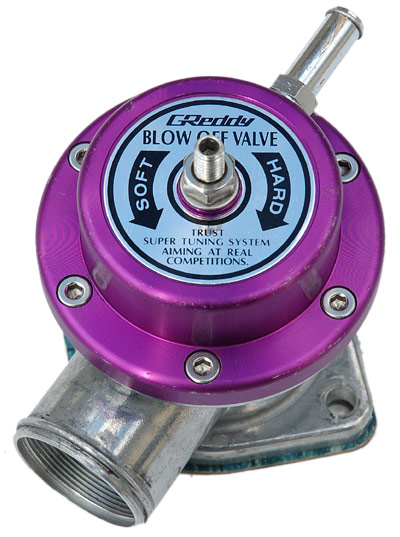
A blow off valve is an important part to any turbocharged or supercharged vehicle. These valves save our forced induction components in a way that most users may over look. Other terms you may hear or read about that are essentially the same thing to Blow Off Valve, are recirc valves, diverter valve, bypass valves, or the abbreviation BOV.
Why we have blow off valves?
Blow off valves ( BOV’s ) are important in helping with the longevity of turbochargers and centrifugal superchargers. These valves open whenever there is enough boost pressure in the intake pipes, and vacuum from the intake manifold. Essentially, these valves operate every time the throttle is opening enough to create boost pressure, and then backed off to create vacuum. When this valve opens it releases the pressurized air in the intake piping either back to the turbo intake piping or vents it to the atmosphere. The reason this is important is because if that pressurized air is not allowed to escape once the throttle butterfly closes, then the air will apply pressure on the turbo or superchargers compressor wheel putting un-wanted stress on it. While this stress is very small, over time it can cause added wear to the bearings and cause the unit to fail prematurely.
Another great benefit of a BOV, other than adding longevity and reliability to your set-up, is that it can help maintain turbine speeds in-between shifts adding a performance enhancement as well to the vehicle. There are not many modifications one can do to an engine that can give them reliability and POWER, so a BOV should be an essential component on your list if running a turbocharger or centrifugal blower.
Re-circulating Vs Vented Blow off Valve
Recirculating Blow Off Valve
A re-circulated BOV is one where the boost pressure is re-circulated back into the intake just before the turbo. This type of set-up is a must for those that are running a Mass Air Fuel ( MAF) sensor. The reason for this is that the MAF has already accounted for the air that is in the intake manifold, and if it was allowed to escape to the atmosphere, the car would run overly rich due to the fact that the ECU still believes that the air is in the intake tract. A bonus to running a re-circulated BOV is that the air being re-circulated can be brought back into the turbochargers intake pipe at a location and angle so that the air pressure is forced directly onto the compressor wheel. This will aid even more in helping to keep the turbo spooled up and running in-between shifts, or times when you are quickly on and off the gas pedal. A turbo type made by borg warner turbo systems called the EFR series has a build in, re-circulated BOV built into the turbo's compressor housing.
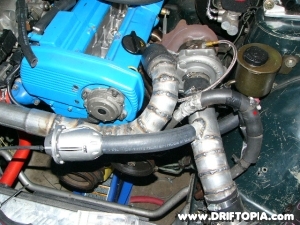
Vented Blow Off Valve
A vented BOV is one where the air is just released to the atmosphere instead of being re-circulated back into the system. Many argue that all BOV’s should be re-circulated back into the turbo’s intake tract to gain that slight performance increase in response, but some argue the sound of a vented BOV makes up for any performance loses. Another thing to note is that setting up a Vented Blow Off Valve is simpler than a Re-circulated set-up just for the pure fact that there is really nothing to set-up, you just vent the air out. Ultimately its up to the end user which method they choose to employ on their particular set-up.
How a Blow Off Valve Works
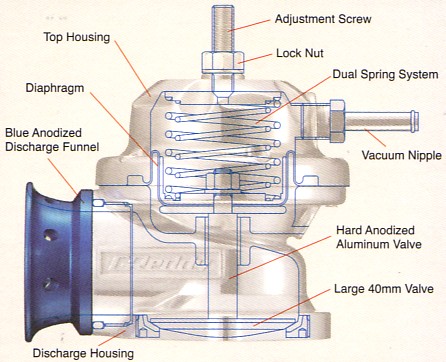
A Blow Off Valve works the same as a Wastegate does with a valve controlled by a diaphragm. The diaphragm has a spring and a vacuum port input to help open and close the valve. A great article has been written on this topic in the How a Wastegate Works section. If you are un-familiar with how a Wastegate works as well as a BOV follow this link over to the Wastegate article for a more in-depth look at how Wastegates and Blow Off Valves work.
A few of the leading Blow of Valve manufacturers are Tial and HKS who offer a variety of universal and direct fit products:
If you have any other questions on comments that should be added to this article, please click the Contact Us button.
***Remember*** to check for other relevant information in the columns and article tables.
ATTENTION READER:
If you enjoyed the information and article you just read be sure to check out our newly released book with even more exciting photo's and information:How to Turbocharge and Tune your Engine
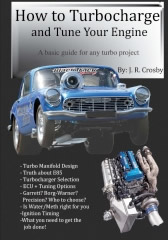
Want to know more about your particular Make and Model vehicle? All of these vehicles are covered in the tech, maintenance and repair articles found above. Enginebasics is the wiki or wikipedia of car part, repair, how to and tuning information. Let us be the class 101 for your automotive learning.
| Ford | General Motors GM | Pontiac | Jaguar | Land Rover | Nissan |
| Toyota | Honda | Lexus | Acura | Lotus | Scion |
| Infinity | BMW | Mercedes | Mitsubishi | Ferrari | Maserati |
| Lamborghini | Volks Wagen VW | Saab | Audi | Hyundai | Kia |
| Subaru | Mazda | Chevy | Volvo | Caddilac | Dodge |
| Chrylser | Daewoo | Porsche | Mercury | Freightliner | MG |
Individual Models
| Ford Mustang | Mitsubishi Eclipse | Mitsubishi Evo | Subaru WRX / STI | Dodge Viper | Chevrolet Corvette |
| Nissan Skyline | Honda S2000 | Nissan 350z | Toyota Supra | Chevy Camaro | Lotus Elise Exige |
| Honda Civic | VW Golf | Dodge SRT-4 | Eagle Talon | Acura Integra | BMW M3 |
| Nissan 240sx | Porsche 911 | Acura NSX | Honda Accord | Toyota Camry | Toyota MR2 |
| VW R32 | Dodge Truck | Mazda Rx7 | VW Jetta | Sand Buggy | Nissan Sentra |
For the latest Automotive news and stories visit the websites below |
Our feature Build: An AWD V6 Civic




